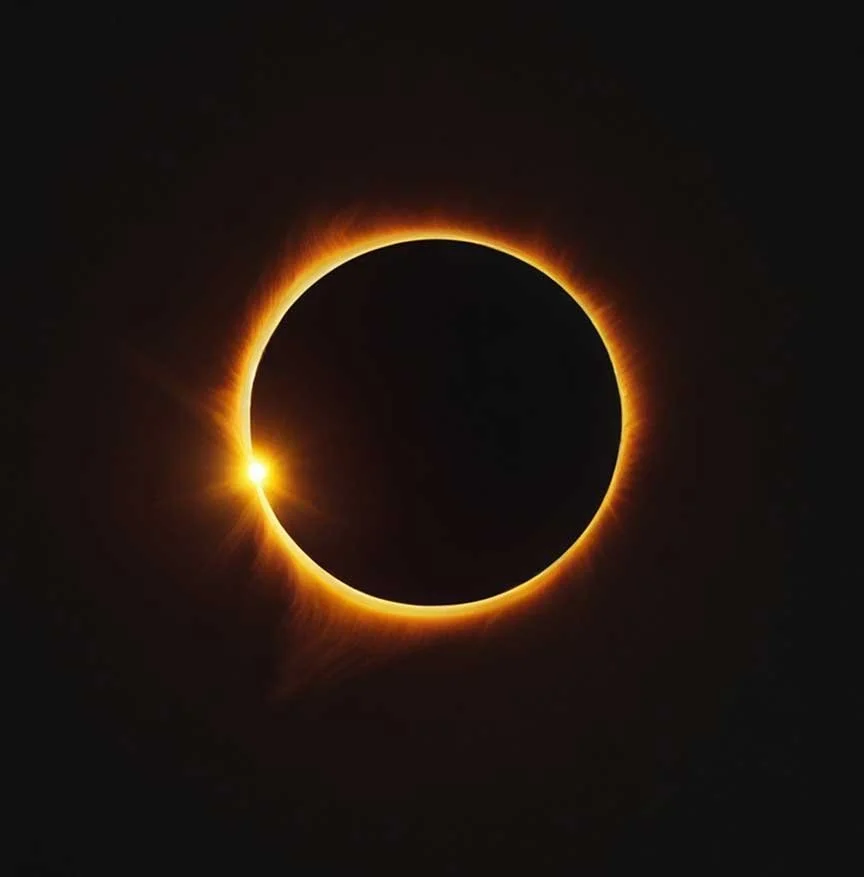Virgo Eclipse 2025: Cycles of Healing, Work, and Transformation
On September 21st, 2025, the partial New Moon eclipse is at the potent anaretic degree of Virgo. The last degree of a sign (29°) suggests a call to action, fated events, facing challenges head-on, and a major transition depending on where it occurs in an individual’s birth chart. It’s a liminal space involving themes of releasing, transitioning, and new beginnings. Virgo themes are about health, work, service, perfectionism, and attention to detail in our everyday routines and tangible reality.
Eclipses happen when lunations occur in close proximity to the lunar nodes. The north node in our natal birth charts encourages us to move toward our greater purpose and develop more fully in the zodiac sign and house where it falls. The south node, on the other hand, is about what comes naturally to us and what we feel most comfortable tapping into. It not only symbolizes releasing patterns but also bringing forth the gifts we have already mastered as we move toward the more challenging north node. I personally see the nodes as striking a balance between the two.
This eclipse in Virgo is ruled by Mercury in Libra. Though this eclipse opposes Saturn and Neptune, suggesting much effort and possibly confusion, Mercury forms a harmonious grand trine with Uranus in Gemini and Pluto in Aquarius. In addition, there is a kite aspect with Neptune at the apex point. Neptune here suggests connection to a higher purpose, dissolving limitations or illusions, and transforming abstract ideas into tangible reality. Our nervous systems may feel amped up at this time, along with increased tiredness.
This eclipse is part of Saros series 154 and it’s on the south node. We cannot look at a specific eclipse in isolation. Eclipses are cyclical and repeat in the same signs every 9 and approximately 19 years. The 9-year cycles are the reverse nodes, when they flip—signifying a midpoint in life themes that were established around the previous nodal return in our birth charts. Eclipses are analogous to chapters of our lives in the great book of our entire lifetime. There is a plot line as we spiral and evolve through similar cycles over time.
Author Bernadette Brady describes this particular eclipse as “bringing to the surface worries about loved ones, health, or issues to do with paperwork or communication.” This cycle is an opportunity to address work, health, service, and what no longer works for us. It’s also about what does work for us, and moving toward a new direction that may require effort and sacrifice to succeed.
The best way to gain insight into our personal eclipse cycle themes is to look at previous eclipses in Virgo and Pisces in the whole-sign houses of our birth charts. Think about the following time periods and see if you notice any recurring themes:
1997–1998
2006–2008
2015–2017
I will use myself as an example: In whole-sign houses, Virgo is in my second house of financial resources—all resources I can draw upon. In other words, besides finances, what supports me? Pisces falls in my eighth house, involving themes of shared resources, legacies, profound depth in relationships, deep psychological transformation, the occult, and life-and-death matters. I also use the Placidus house system, where Virgo falls in both my first and second houses, and Pisces falls in my seventh and eighth houses. That’s a topic for another time.
I had my first astrology reading in October 1997 and immediately knew I had to study it until I could read my own chart. I studied and read voraciously, determined to become certified as a professional astrologer. I had been searching for a fulfilling vocation in the health and healing field.
Between 2006 and 2008, I began studying shamanic healing after being diagnosed with chronic Lyme disease, which had left me bedridden for most of 2005. I was not fully recovered, but I was determined to understand my health challenges from a more spiritual perspective.
During 2015 through 2017, I was caring for my terminally ill mother. It was truly an eighth-house experience as she declined rapidly. I was constantly filling out paperwork and deeply involved in getting her into a nursing home near me so I could oversee her care on a daily basis. It was traumatic to bring her there for my family. I was regularly attending meetings with the staff, going over notes about her medications and care.
As you can see, a similar thread runs through these cycles.
